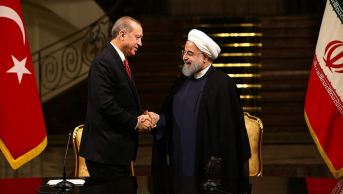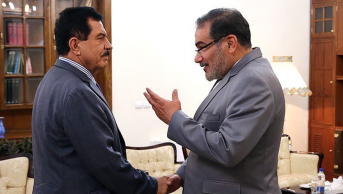Vienna Negotiations: A Turning Point in Nuclear Controversy between Iran and the West

Iran-P5+1 negotiations that aimed at the comprehensive resolution of the nuclear controversy between Iran and the West have still been continuing in Vienna.Basic parameters of the “Comprehensive Joint Action Plan” had beendetermined at the Lausanne negotiations that concludedon April 2, at the end of whichthe parties decided to negotiate till June 30 in order to reach a final solution for the issue. In this regard, delegations of the parties met in Vienna on June 10. Just two days before the end of June 30 deadline,the negotiations were extended till July 7.
The extension of the negotiations sparked both positive and negative assessments among the observers.The extension of the negotiations for only a week without any interruptionis viewed as a strong sign for the prospective comprehensive agreement.However, officials have beenverycautious in their statements that the agreement is very close to settle, but not guaranteed. In the meantime, both American and Iranian officials on the one hand have asked the other party to be determinantfor a diplomatic solution, on the other hand they have stated that “non-agreement is better than a bad agreement,” which provedthe toughness of the negotiations. That is why both John Kerry, the US Secretary of State and M. JavadZarif, Foreign Minister of Iran said that they have made “genuine progress” in the discussion, but there are still some unresolved issues remained. Due to the principle of “nothing is agreed unless everything is agreed”, they have not publicly talked about the agreed points.
The negations are so tough primarily because of two reasons. First, members of the 5+1 group are not identical in their approaches to the Iranian nuclear program. Anticipations and concerns of China and Russia with regard to the negotiations are very different from concerns of US, Britain Germany, and France.However, the priorities of the Western countries, especially the United States who vehemently opposed to the Iranian nuclear program from the very beginning, have remained dominant in the process. For this reason, in addition to joint meetings, the Iranian delegation holds bilateral meetings with the relevant countries.
The second reason that made negotiations tough is the comprehensive nature of the addressed issue. The talks are focused on the adjustment of Iranian nuclear program and facilities, sanctions and verification measures. Iran is supposed to revise its facilities in Arak and Fordow, to decrease the number of centrifuges in Natanz, and to reduce its low-enriched uranium stockpile which is around 8,7 tons. The talks are aimed to provide a schedule for the adjustment of Iranian program and facilities. The second major topic handled in the talks is the removal of US, EU and UN sanctions imposed on Iran due to the nuclear controversy. While Iran insists on the removal of all sanctions simultaneously with the implementation of the prospective agreement, the Western parties are trying to make sanction reliefs conditional on the implementation of the agreement.
The third, and the toughest issue, is the verification of Iranian nuclear program and implementation of the prospective agreement. In this regard, there are two critical points. The first is related to the scope of the inspections and features of to be inspected places. The Western parties are insisted on authorizing IAEA inspectors so that they could review any place at any time without any previous notice. However, Iran does not agree its military sights to be inspected.
Another critical point is the possible military dimensions (PMD) of Iranian nuclear program. Actually, the rise of this issue is almost equal to a return to the very beginning of the negotiations. As it is wellknown, for long years the United States has claimed that the Iranian nuclear program aimed at reaching nuclear weapons. With the negotiation process, the United States aspired to keep Iran far from nuclear threshold for at least one year. Additionally, the United States asks Iran to reveal its past record of military-related nuclear activities. However, Iran always rejected such claims and advocated that its programwas for solely peaceful purposes. Nevertheless, the IAEA reports on Iran permanently drew attention to possible military dimensions of Iranian nuclear program and highlighted its concerns with regard to activities in the Parchin military base. The IAEA recently reiterated its concerns “about the possible existence in Iran of undisclosed nuclear-related activities involving military related organizations, including activities related to the development of a nuclear payload for a missile” and asked Iran to cooperate fully with the Agency. The IAEA is supposed to prepare a new report on this issue till the end of the year. Additionally, the rise of the issue of possible military dimensions necessitates bringing Iranian armament activities, especially its ballistic missile program to the negotiating table. The Western countries in P5+1 group ask Iran to stop its ballistic missile program as well. However, Iran not only rejects that demand, but requests removal of sanctions on Iran’s armament and missile programs.
Despite the thorny nature of issues at the negotiating table, there is some pressure over the delegations to reach the final comprehensive deal in a short span of time. First, the US administration should submit the prospective agreement to the Congress for review by 9th of July. If delayed, the Congress will have an extra month to review the agreement, which may possibly unleash fierce debates inside the United States. Additionally, the extension of the talks empowers the position of those critical of negotiations both in Iran and in the West. That is, further extension of the talks increase political and mental pressure over the negotiating teams. That is why Kerry recently urged Iran to make the necessary “hard choices” and if they are not made that will mean walking away from the negotiations on the part of the US. On the other hand, Zarif stated that the West “need to make a critical and historic choice for eitheragreement orcoercion.” A leading member of Iranian delegation Abbas Araqci stated that Iran is not bound with deadline of July, 7th and added that “Tehran will not accept a bad deal and is looking for an agreement that respects its red lines and the Iranian nation’s rights.”
Apparently, all the parties think that they have flexed enough and ask the other party to take political initiative. All the delegations stated that they are very close to the settlement, but they will not accept a “bad deal.” It means the parties are at a critical turning point to reach an agreement or to break 18-month negotiations. However, given the importance of a diplomatic solution to the nuclear controversy for the relevant parties, and the difficulty of the addressed issues, the pressure of time becomes less significant. For this reason it is possible that the talks maybe extended for an additional time period. Additionally, the prospective agreement in Vienna will not mean the settlement of all issues between Iran and the West, butthe lack of agreement will not mean the collapse of all communicationbetween the parties either.










